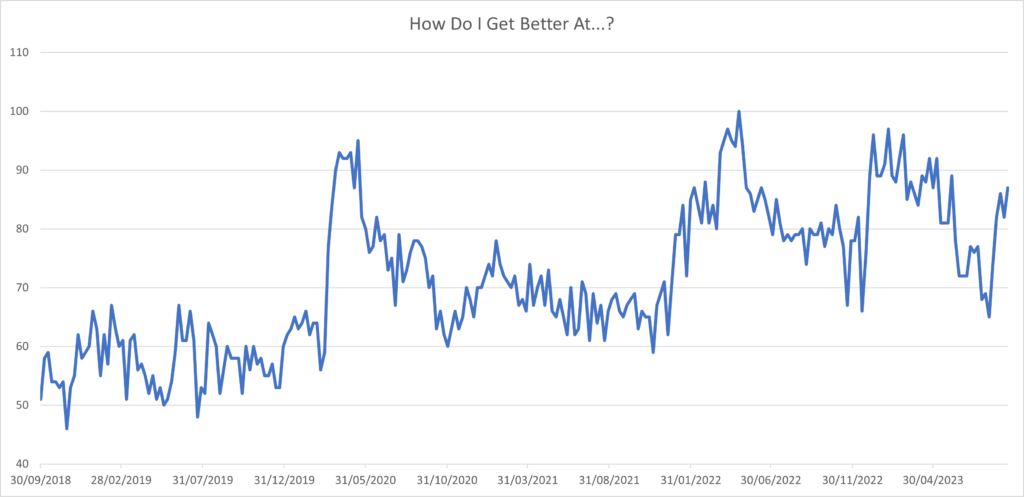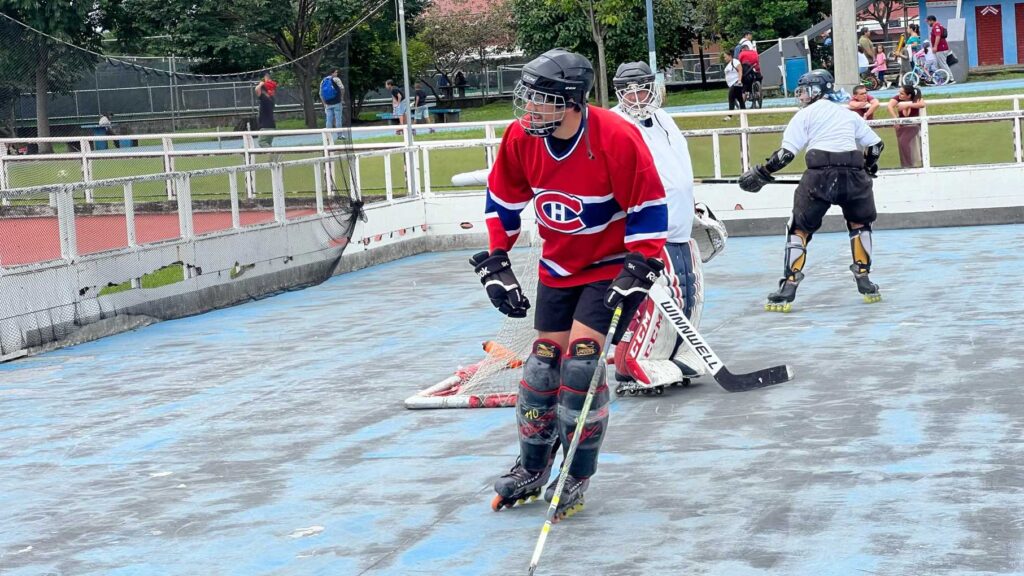I suck at this.
Hockey is my favorite sport, but I suck at it. I really do. In the last game, my presence alone cost my team three goals, and it’s okay.
Sucking at something is essential for life’s enjoyment.
The beauty of this is that I can play a sport I love and, most importantly, get better at it–all at the cost of my teammates’ frustration. I’m kidding, of course, and I’ll dive into that later.
In reality, being bad at something is great. It’s even more rewarding when you used to be good at it. You see, years ago, I didn’t suck at this. I wasn’t the best, but my skill was above average.
So, what happened? How did I suddenly suck at something I used to do? Life got in the way, and hockey is just an example of the many instances in life where we have to be bad at something.
The challenge of starting something new
Here’s a summary of what happened. Long story short, in 2018, I was struck by lightning.
The accident left me with neurological damage, hearing loss, balance issues, and a long road to walking by myself once again.
At that moment, the goal was to be completely independent. This meant not leaning on my wife (literally).
You could say that, at first, I sucked at walking after the accident. I did.
Granted, there was a cause of force majeure, but the reality was that I didn’t walk properly.
So, the first step was to walk again, which meant the most grueling rehab I’ve ever done. Day in and day out, I pushed through the pain and moved my feet up and down, up and down.
Then, I stood on one leg. And the other.
I had to perform exercises I once thought came naturally for days, weeks, and months. By doing so, the movement came back in slow, steady gains.
It took me close to a year to gain a normal walking pace–one where I didn’t fall constantly or have to lean against a wall.
Regaining something as basic as the ability to walk and move about independently taught me one lesson. It’s okay if it isn’t perfect.
So, logically, the thought of playing hockey was far off. At times, it felt like something that would never happen again. In other instances, that question lingered in the back of my mind: what if I could skate again someday?
It had taken so much time to learn to walk again that I had to change that question.
What if I learn to play hockey?
I suck at this
I will always appreciate that my wife let me keep my hockey gear. Our apartment is too small for hockey sticks and large shin pads, but I never threw them away.
It could’ve been a memento of a better past or a subconscious motivator to eventually skate again. Whatever it was, it helped.
In late 2022, I finally decided to skate once more. My mindset was to take this challenge on as a newbie. I was a rookie and had to forget everything I had learned.
After months of skating again, I think of hockey gear as a set of tools. It’s what you need to get started, and it doesn’t have to be perfect.
My skates were worn out, my sticks with a withering blade, and my gloves riddled with holes. But, they were enough to start.
They were as valuable a tool as a cheap notebook to start writing or an old laptop to start coding. Whatever helps you get that first step is all you need.
At the same time, I made a promise to myself. Though I love having the best skates and sticks, I wouldn’t pay for anything. I couldn’t spend money on expensive gear and didn’t want to spend money until I honed my skills enough. It has happened with hockey and with other stuff.
The pleasure of small improvements
After the lightning strike, my legs get numb if I work out too hard. It’s another big lesson I’ve embraced because I can get carried away.
It happened with my first skating sessions. They were chaotic. I’m 6’4” and it’s a long down. I tumbled, got up, tumbled once more, and then skated to the bench. I had to take a break.
My legs trembled, and my bum burned. My muscles ached so much that I felt I had already finished a marathon, and it was only the first skate.
After only half an hour of having my gear on, I had to call it quits for the day. At first, it was a defeat. That’s how it felt, but then, as I drove back home, it hit me.
I had skated. After years of working hard on walking and focusing on the fact that I had to stand tall, I was now skating.
Sure, it felt as though I was back to square zero. To a degree, I was, but I had skated.
Then came the next weekend, and I was strapping my skates on again. During the week, I worked out, focusing on balance and ankle strength, and it all paid off. This time, the legs didn’t shake to the core.
Instead, I skated for half an hour without burning or trembling and with far fewer tumbles. However, there was a bigger influence.
A community is essential to help you improve
I’ve known most players in my league for nearly twenty years. Many of them reached out when the accident happened, and they were more than supportive, all in their own way.
When I got back to skating, they were just as supportive. First of all, they have had immeasurable amounts of patience during pickup games. They’ve also guided me with tips on how to improve my skating and balance.
Most importantly, they have made the hockey rink a safe place. Every time I plummet to the ground because my legs don’t respond quickly, they don’t lash out. Of course, my mind kept saying: «I suck at this», but having their support soon erased that thought.
Instead, they know how to push my boundaries in the right way. Sure, they go soft in the corners when I’m there, but they still bump and pickpocket when they have to–it’s all part of the game.
They’ve understood that this learning takes time. I’ve also taken action and chose not to participate in tournaments. The sheer responsibility of knowing that my performance could hurt my team is too much. So, those three goals? Yeah, they were during a pickup game.
If I hadn’t had them as teammates and opponents, chances are I would’ve remained in place. I wouldn’t have had the fuel to improve in those small increments. Ultimately, a community is more about making you feel like you belong, regardless of the level.
Speaking of level, that’s been essential as well.
Find others who are also beginners
Every Saturday, you’ll find me at hockey school. You can see a lumbering 6’4”, 250-pound grown man skating next to 8-year-olds who skate better than me.
The truth of the matter is that those lessons work. Every time I skate with them, I go back to the basics. I listen to the professor and pay attention to the rudimentary exercises. Sure, there’s a moment when I say «I suck at this», but it’s all about getting over it.
At first, it felt frustrating, sure, but as time passed by, I noticed that I enjoyed those little details. Crossovers still claim the best of me, at least turning right, but I’ve dominated the left side.
It wouldn’t have been possible without the tips and lessons I get on Saturdays. Now, I can skate for two hours straight and not feel a pinch of discomfort.
But why am I telling you this?
Well, just recently, I took up coding lessons. I’m looking to venture into new areas, partly as a hobby and partly as a possible pivot. I’ve noticed that I suck at coding, and that’s fine.
The problem is that society doesn’t think so.
Don’t expect to be an expert (just yet)
The following chart shows consistent behavior. It’s from Google Trends and, if anything, it indicates a solid performance, with a considerable increase in the last two years.

It responds to the search term “how to get better at.” We love improving ourselves but sometimes fail to understand that we require patience. Lots of it. Many of us say «I suck at this», and stay there. Meanwhile, we forget something.
Learning anything, even walking, takes guts and, most importantly, time. We won’t be experts at first. In fact, we may never be experts at all, and that’s fine.
I love walking. Now, more than ever, if I can walk, I’ll do it. Every step is an exercise in itself and one that I love. I no longer say «I suck at this», and that’s very valuable.
I don’t know how many people focus on walking. Let alone how many of them pay attention to how others walk, but I do.
You might not be the most elegant walker out there. Look at how people walk; you’ll see that there are no perfect walkers, but they walk well enough to traverse any path.
